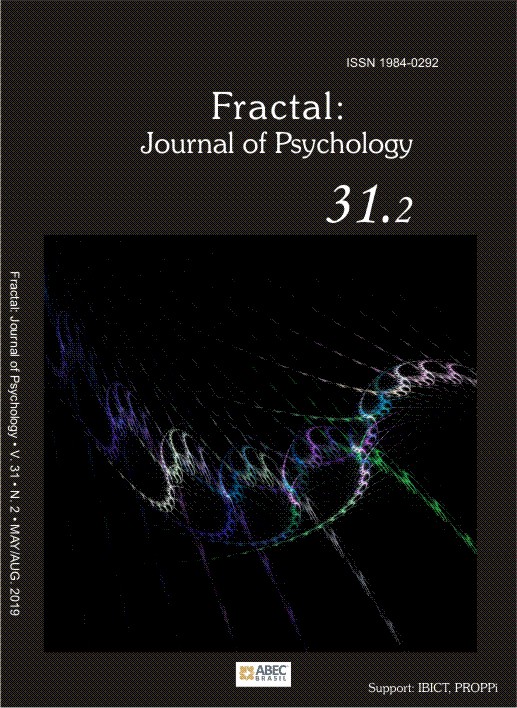Epistemological inflexions: the etnopsychiatry
DOI:
https://doi.org/10.22409/1984-0292/v31i_esp/29001Keywords:
Ethnopsychiatry, culture, psycheAbstract
The Ethnopsychiatry founded by Geroges Devereux emerged as a possibility to reflectabout the intercultural encounter and its unfolding regarding the understanding of psychological disorders and the coherence between therapeutics and etiologies of this psychopathological states. The theoretical thesis that led to the creation of the discipline arises from inflections based mainly on the studies from Freud’s, Malinowski’s and Rheheim’s theory, along with later contributions by Lévi-Strauss and Bastide. Tobie Nathan is later credited for creating an intervention clinical model and a practice. This article aims to present the history of the precursory principles that led Devereux to the theoretical thesis and the resulting creation of Ethnopsychiatry and also to make considerations about the experience acquired in the application of the model of practice proposed by Nathan and multiplied by other clinicians. From the postulate of the universality of the psychological structure which is particularily constituted by culture, the discipline comprises an intrinsic relation existing between culture and the psychic functioning, in which culture uses the same elements, processes and defense mechanisms as the psyche. Adopting the double discourse method - Psychoanalysis and Ethnology –the discipline defines itself as complementary. Ethnopsychiatry emerges as a possibility to look at the gap that Western psychiatry left to explain psychological disorders, as well as to show how its model of intervention advocates to position the discipline as an apprentice in the intercultural encounter.Downloads
References
BETTS, Jaime. Diferença cultural, sofrimentos da identidade e a clínica psicanalítica hoje. SIG Revista de Psicanálise, v. 2, n. 1, p. 85-97, 2013. Disponível em: http://sig.org.br/wp-content/uploads/2016/04/Num_2_EmPauta2.pdf. Acesso em: 22 jul. 2018.
BOAS, Franz. Antropologia Cultural. CASTRO, Celso (Org). Rio de Janeiro: J. Zahar, 2004.
CUCHE, Denys. A noção de cultura nas ciências sociais. Bauru: EDUSC, 1999.
DEVEREUX, George. Reality and dream: the psychotherapy of a plains indian. New York: International Univ Press, 1951.
DEVEREUX, George. Ethnopsychanalyse complémentariste. Paris: Flammarion, 1985.
FERMI, Patrick. Géza Róheim ou la psychanalyse en voyage. L’Autre, v. 9, n. 1, p. 57-66, 2008. https://doi.org/10.3917/lautr.025.0057
FERRADJI, Taïeb. Culture et psychopathologie chez les jeunes migrants musulmans installés en France. In: MEKKI-BERRADA, Abdelwahed. (Ed.). L’Islam en anthropologie de la santé mentale: théorie, ethnographie et clinique d’un regard alternatif. Münster: Lit Verlag, 2010. p. 135-149.
FREUD, Sigmund. Totem e Tabu (1913). In: SALOMÃO, Jayme (Org.). Obras Psicológicas Completas de Sigmund Freud. Rio de Janeiro: Imago, 1974. v. 13, p. 13-194. Edição Standard Brasileira.
GRANDSARD, Catherine. Enveloppe culturelle et attachement social. Santé Mentale, n. 135, p. 46-49, févr. 2009. Disponible sur: http://www.ethnopsychiatrie.net/CGrandsardEnvelop.htm. Consulté le: 21 juil. 2018
GUERRAOUI, Zohra.; PIRLOT, Gérard. Comprendre et traiter les situations interculturelles. Bruxelas: Groupe de Boeck, 2011.
LAPLANTINE, François. Aprender Etnopsiquiatria. São Paulo: Brasiliense, 1998.
LECOMTE, Yves; JAMA, Sophie; LEGAULT, Gisèle. Présentation: L’ethnopsychiatrie. Santé mentale au Québec, v. 31, n. 2, p. 7-27, 2006.
LÉVI-STRAUSS, Claude. Antropologia Estrutural. São Paulo: Cosac Naify, 2012.
MARTINS-BORGES, Lucienne. Migrações involuntárias e impactos psíquicos: a mediação da cultura. In: PERES, Rodrigo Sanches et al. (Org.). Sujeito contemporâneo, saúde e trabalho: múltiplos olhares. São Carlos: Edufscar, 2017. p. 169-186.
MARTINS-BORGES, Lucienne; POCREAU, Jean-Bernard. A identidade como fator de imunidade psicológica: contribuições da clínica intercultural perante as situações de violência extrema. Psicologia: Teoria e Prática, São Paulo, v. 11, n. 3, p. 224-236, 2009. Disponível em: http://pepsic.bvsalud.org/scielo.php?script=sci_arttext&pid=S1516-36872009000300016&lng=pt&nrm=iso. Acesso em: 13 jun. 2018.
MORO, Marie-Rose. Principes théoriques et méthodologiques de l’ethnopsychiatrie: L’exemple du travail avec les enfants de migrants et leurs familles. Santé mentale au Québec, v. 17, n. 2, p. 71- 98, 1992.
MORO, Marie-Rose. Parents en exil: psychopathologie et migrations. 2. ed. Paris: PUF, 2001.
MORO, Marie-Rose. Psicoterapia transcultural da migração. Psicologia USP, São Paulo, v. 26, n. 2, p. 186-192, 2015. http://dx.doi.org/10.1590/0103-6564D20140017
NATHAN, Tobie. La folie des autres : traite d’ethnopsychiatrie clinique. Paris: Bordas, 1986.
NATHAN, Tobie. Fier de n’avoir ni pays, ni amis, quelle sottise c’était. Paris: Dunod, 1993.
NATHAN, Tobie. L’Influence qui guérit. Paris: Odile Jacob, 1994.
NATHAN, Tobie. Georges Devereux et l’ethnopsyquiatrie clinique. Nouvelle Revue d’Ethnopsyquiatrie, n. 35-36, p. 7-18, 1998.
NATHAN, Tobie. Entretien avec Tobie Nathan: questions d’ethnopsychiatrie. Outre-Terre, v. 2, n. 11, p. 575-581, 2005.
NATHAN, Tobie. Comment faire place à l’étranger? L’ethnopsyquiatrie et la loi de l’hospitalité. Conférence de Tobie Nathan le 11 février 2014, à l’Institut des Hautes Études des Communications Sociales (Bruxelles).
PIERZO, Marie-Élizabeth; LEGAULT, Gisèle. L’interface Ethnopsychiatrie et intervention sociale. In : LEGAULT, Gisèle. (Org.). L’Intervention interculturelle. Gaëtan Morin: Boucherville, 2001. p. 286-287.
POCREAU, Jean-Bernard. De l’ethnopsychiatrie à la psychiatrie transculturelle: un parcours sensible à la rencontre de l’autre. In: SEFFAHI, Mohammed (Dir.). Autour de Laplantine: d’une rive à l’autre. Paris: Archives contemporaines, 2013. p. 71-89.
POCREAU, Jean-Bernard; MARTINS-BORGES, Lucienne. La cothérapie en psychologie clinique interculturelle. Santé mentale au Québec, v. 38, n. 1, p. 227-242, 2013. https://doi.org/10.7202/1019194ar
ROUDINESCO, Elisabeth; PLON, Michel. Dicionário de Psicanálise. Rio de Janeiro: J. Zahar Editor, 1998.
Downloads
Published
How to Cite
Issue
Section
License
Authors publishing in this journal agree to the following terms:
- Authors retain copyright and grant the journal the right of first publication, with the work simultaneously licensed under the Creative Commons Attribution License allowing sharing of the work with acknowledgement of authorship of the work and initial publication in this journal.
- Authors are permitted to enter into additional contracts separately for non-exclusive distribution of the version of the work published in this journal (e.g., publishing in an institutional repository or as a book chapter), with acknowledgment of authorship and initial publication in this journal.

This work is licensed under a Creative Commons Attribution 4.0 International License.
To the extent possible under the law, Fractal: Journal of Psychology has waived all copyright and related rights to the Reference Lists in research articles. This work is published in: Brazil.
To the extent possible under law,Fractal: Journal of Psychology has waived all copyright and related or neighboring rights to Reference lists in research articles. This work is published from: Brazil.







